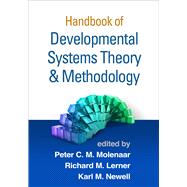Developmental systems theory provides powerful tools for predicting complex, dynamic interactions among biological and environmental processes in human behavior and health. This groundbreaking handbook provides a roadmap for integrating key concepts of developmental systems theory (such as self-organization, reciprocal dynamic interaction, and probabilistic epigenesis) and simulation models (connectionist and agent-based models) with advanced dynamic modeling approaches for testing these theories and models. Internationally renowned developmental science scholars present innovations in research design, measurement, and analysis that offer new means of generating evidence-based decisions to optimize the course of health and positive functioning across the life span. Topics include epigenetic development and evolution; the relationship between neural systems growth and psychological development; the role of family environments in shaping children's cognitive skills and associated adult outcomes, and more.








